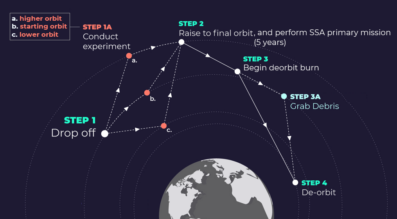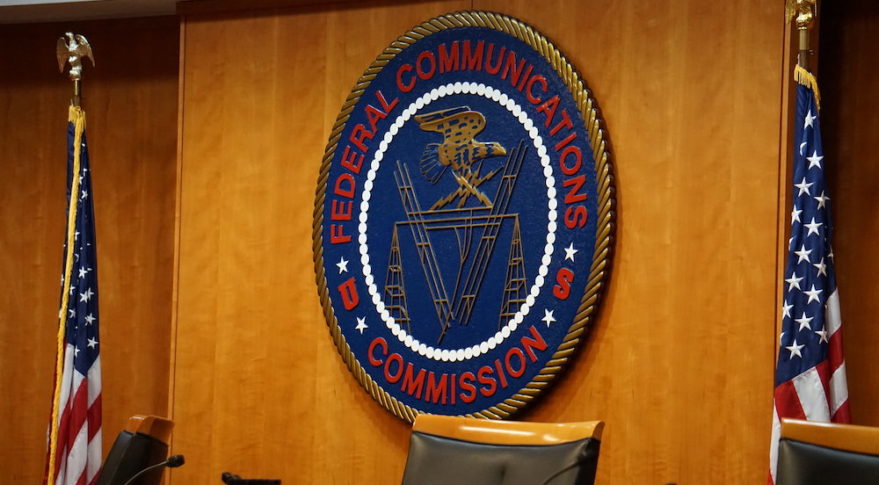
Turion Space licensed to sell commercial SSA data
California startup Turion Space said Aug. 24 it has secured U.S. regulatory approval to sell space situational awareness services from its first satellite next year. SpaceX is slated to fly the venture’s Droid.001 satellite May 15 on a Falcon 9 rideshare mission, Turion Space CEO Ryan Westerdahl said in an interview.
Lithuania-based NanoAvionics built the bus for the satellite, which will provide imagery for Australian in-orbit inspection startup HEO Robotics, Turion Space’s first customer.
Droid.001’s primary mission, however, is to test imagery capabilities that Westerdahl declined to specify for an SSA business he sees as a stepping stone toward more direct in-orbit services.
After deploying three to four more SSA-focused Droids by around mid-2024, he said the startup plans to test a vision system for autonomous rendezvous operations with one of its spacecraft already in low Earth orbit.
“By 2025, we want to do our first docking and de-orbit demonstration,” he said.
Westerdahl ultimately envisions a constellation of Droids that can be tasked to provide services as needed. When that mission is over, they would return to their “home orbit” to track objects in space until they are called upon again.
“We’re an early-stage startup and we don’t necessarily know how big our constellation is going to be yet,” he said.
“All I can tell you with certainty for now is we’re going to build as many as we can, as fast as we can, without spending all our money and without going bankrupt.”
Turion Space has raised $7.5 million in venture capital, which he said covers its first two satellites.
The startup plans to deploy its second satellite in the fourth quarter of 2023, although it has not yet selected a launch provider.
Earlier this year, Turion Space secured four contracts worth a combined $1 million from the U.S. Space Force’s Orbital Prime program, which will support the development of its in-orbit logistics capabilities.
Orbital Prime launched last year to focus on emerging in-orbit servicing, assembly and manufacturing capabilities.
Westerdahl said the startup is using funds raised from government contracts for research and development on the logistics side of its business, as well as finding ways to expand its SSA capabilities.
Money raised from venture capital investors is supporting an SSA-focused commercial business, which would use early satellites that are not going to be focused on space logistics.
“Although we think in-space logistics is a market primed for takeoff, we are prioritizing moving fast and deploying revenue generating assets early to maximize learning and market traction,” he said
Turion Space, which employs 17 full time engineers, is one of a rising number of early-stage companies that are developing space-based solutions to improve SSA
✓
FCC Commissioner criticizes Starlink’s $900 million subsidy rejection

TAMPA, Fla. — The Federal Communications Commission denied Starlink nearly $900 million in rural broadband subsidies “without legal justification,” one of the regulator’s four commissioners said Aug. 24.
While the FCC was obligated to review subsidies provisionally awarded for SpaceX’s broadband service in December 2020, Commissioner Brendan Carr said the agency exceeded “the scope of that authority” when it rejected them nearly two years later.
SpaceX was in line for $885 million after successfully bidding in an auction for the FCC’s Rural Digital Opportunity Fund (RDOF).
However, the FCC said Aug. 10 SpaceX had failed to show it could meet requirements for releasing the subsidies, which covered broadband services spanning nearly 643,000 homes and businesses in 35 states.
These requirements included providing 100 megabits per second (Mbps) download speeds and 20 Mbps upload speeds.
“We cannot afford to subsidize ventures that are not delivering the promised speeds or are not likely to meet program requirements,” FCC chair Jessica Rosenworcel said in an Aug. 10 press release.
Carr said he was surprised to learn about the decision from a press release while he was on a work trip to Alaska, adding that it was made without a vote or authorization from the FCC’s Commissioners.
“As an initial matter, this a very curious outcome because the reasons the agency offers for backtracking on this infrastructure decision do not withstand even casual scrutiny,” he said.
The FCC’s skepticism is in “direct conflict” with the confidence expressed elsewhere in the federal government, he said, pointing to how the Air Force recently signed a $1.9 million deal to provide Starlink services to military bases.
While the FCC said it denied SpaceX subsidies partly to avoid rural broadband expansion delays, Carr warned of more delays because there is nothing to replace the commitments SpaceX had made to win a share of RDOF.
It would take “in the neighborhood of $3 billion” to extend high-speed fiber networks to the areas SpaceX had committed to connecting via its subsidies.
Carr also pointed to data showing a year-on-year increase in Starlink speeds as SpaceX expands its constellation in low Earth orbit.
Ookla speed tests showed median download speeds for Starlink improved 38% to 90.55 Mbps in the first quarter of 2022, compared with the corresponding quarter last year.
However, Ookla also said upload speeds fell from 16.29 Mbps to 9.33 Mbps.
In any case, Carr said broadband speed benchmarks under RDOF do not kick in for another three years.
“Particularly given the speeds Starlink is already offering and the pace with which it is continuing to launch satellites, the FCC’s decision offers no reasoned basis for determining that Starlink was incapable of meeting its regulatory obligations,” he said.
“In fact, Starlink is already exceeding those benchmark speeds in other countries where their services are online.”
Carr also took aim at how Starlink’s price point contributed to the FCC’s decision, which highlighted how its users must purchase a $600 dish on top of a monthly subscription.
The FCC is currently subsidizing slower internet services that cost consumers more, according to Carr.
He also said the FCC is not authorized to deny winning RDOF bids based on the price of equipment, “let alone based on an arbitrary one selectively applied to one winner.”
Notably, some Starlink subscribers worldwide are reporting getting their monthly fees reduced, in some cases by up to 50%, although it is unclear what is prompting the price cuts.
Carr’s statement did not mention terrestrial telco LTD Broadband, which was denied $1.3 billion in provisionally awarded subsidies at the same time as SpaceX.
Carr, the senior Republican on the FCC, added that the decision to deny SpaceX rural broadband subsidies “reflects many of the same missteps that the Administration has been making as it implements federal broadband infrastructure programs.”
He has been a vocal critic of an apparent lack of oversight over funds that Congress has been appropriating to tackle the digital divide, and has called for a national strategy to coordinate a technology-neutral approach.
Rosenworcel, who was confirmed as the head of the FCC in December, has also been critical about how the RDOF program was set up in 2020 during the previous administration.
Meanwhile, SpaceX is due to announce a partnership with U.S. mobile operator T-Mobile at 8 p.m. Eastern from its Starbase test site in Texas.
The announcement will be about increasing connectivity, SpaceX said, triggering speculation that the companies will work together in some way to combine their communications networks across the United States


No comments:
Post a Comment